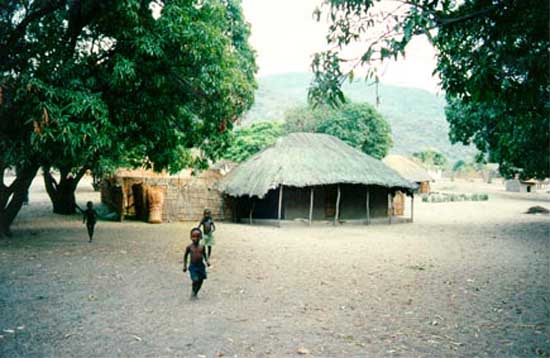
The Nordins came to Malawi in 1997 as Peace Corps volunteers, but now call Malawi home. Stacia is a technical adviser to the Ministry of Education, working to sensitise both policymakers and citizens about the importance of using indigenous foods and permaculture to improve livelihoods and nutrition. Kristof is a community educator who trains people at all levels of society in low-input and sustainable agricultural practices. Kristof complains that maize is not well suited to Malawi because it is susceptible to pests and disease. 'We are not saying stop growing maize. But we try to show people how it can be part of an integrated system, and how integrated agriculture can be part of a balanced diet,' says Kristof. Rivers flow with water from streams, and sustainable agriculture initiatives-like the Nordins' permaculture project-are valuable tributaries in the global effort to eradicate hunger. There is no shortage of innovative ideas in Africa from farmers groups, volunteers, NGOs, universities, and others. And it is a combination of approaches-not one single miracle-that will likely be the most effective.
Malawi RPCVs Kristof and Stacia Nordin use their home in Lilongwe to demonstrate permaculture to local farmers by incorporating composting, water harvesting, intercropping and other methods that build organic matter in soils, conserve water, and protect agricultural diversity
OPINION: Don`t sweep away crop diversity
Source: Worldwatch Institute
Oct. 9, 2010
(0 votes)
Add to Favorites
Anywhere you go in Malawi you find people sweeping the ground clean-floors, sidewalks, bare dirt around homes-even throughout small farms and gardens. Danielle Nierenberg visits Kristof Nordin's permaculture garden in Malawi
Sweeping soil makes everything look tidy, but it causes major damage, making it vulnerable to erosion and nutrient loss. Not removing organic matter around crops has proven to help farmers get more out of the soil and reduce their dependence on high-cost agricultural inputs that can damage the long-term health of soils.
And it's not only the soil that matters in permaculture, but what is grown in it as well. Permaculture emphasizes the same holistic approach to the food system as it does to soils. Unfortunately, just as top soil is often cleared, crop diversity is being lost in Malawi. By planting a variety of indigenous vegetables-like amaranth, dika, moringa, and African eggplant-along with staple grains, farmers can improve food security while relying on local resources.
Efforts throughout Africa to promote staple crops-high in calories but lacking in essential nutrients-have ignored the importance of indigenous foods. Large-scale production of maize, wheat, and rice are wiping out a vibrant base of indigenous vegetables that have nourished Malawians for generations, and traditional foods are going extinct.
Indigenous crops are often resistant to local pests and climatic fluctuations, making them more affordable and accessible to farmers.
But many Malawians see traditional crops as poor-people foods, while hybrid varieties of corn are seen as sophisticated and modern. The country is well known for the so-called 'Malawi Miracle.' After the government began subsidising fertiliser for maize, production has tripled, and Malawi has been touted as an agricultural success story.
While travelling through Malawi as part of our research for the Nourishing the Planet project, we visited a home where the yard was anything but swept clean.
Kristof and Stacia Nordin use their home in Lilongwe to demonstrate permaculture to local farmers by incorporating composting, water harvesting, intercropping and other methods that build organic matter in soils, conserve water, and protect agricultural diversity.
The Nordins came to Malawi in 1997 as Peace Corps volunteers, but now call Malawi home. Stacia is a technical adviser to the Ministry of Education, working to sensitise both policymakers and citizens about the importance of using indigenous foods and permaculture to improve livelihoods and nutrition. Kristof is a community educator who trains people at all levels of society in low-input and sustainable agricultural practices.
Kristof complains that maize is not well suited to Malawi because it is susceptible to pests and disease.
'We are not saying stop growing maize. But we try to show people how it can be part of an integrated system, and how integrated agriculture can be part of a balanced diet,' says Kristof.
Rivers flow with water from streams, and sustainable agriculture initiatives-like the Nordins' permaculture project-are valuable tributaries in the global effort to eradicate hunger. There is no shortage of innovative ideas in Africa from farmers groups, volunteers, NGOs, universities, and others. And it is a combination of approaches-not one single miracle-that will likely be the most effective.
There are more than 600 indigenous and naturalised food plants in Malawi. As Kristof told Nourishing the Planet, 'There's no miracle plant. Just plant them all.'
*Danielle Nierenberg is co-project director of the Worldwatch Institute's Nourishing the Planet project (www.NourishingthePlanet.org). Matt Styslinger is a research intern at Worldwatch.













